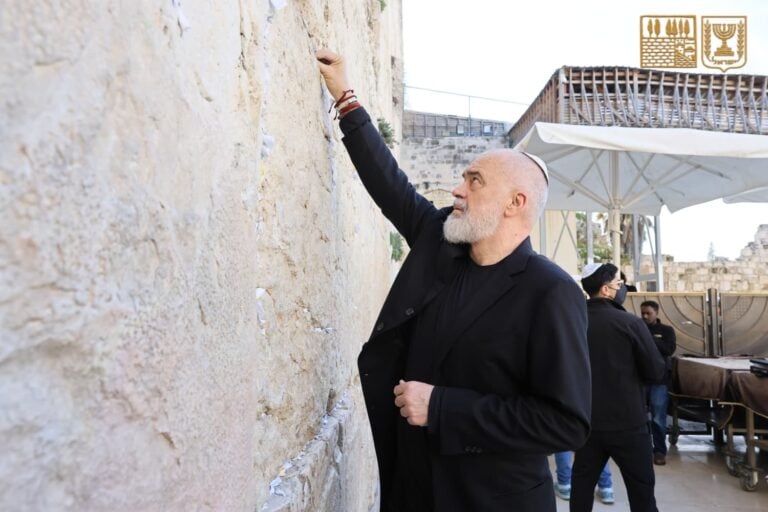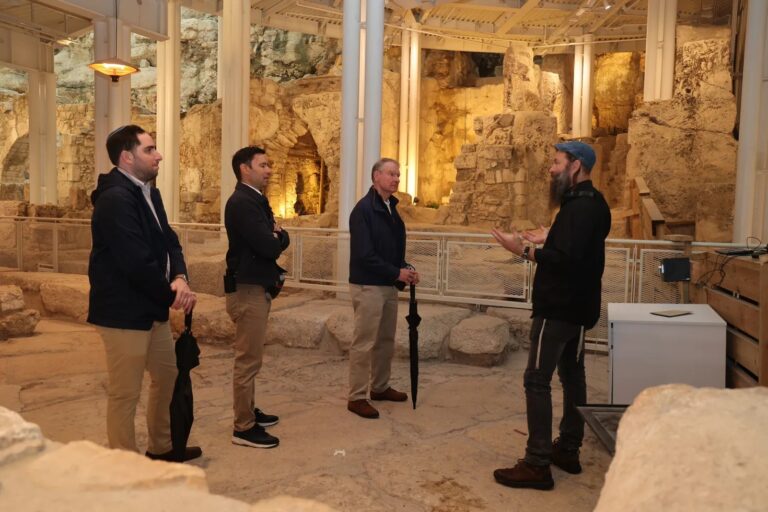Lech Lecha 5786
Rabbi Shmuel Rabinowitz, Rabbi of the Western Wall and lHoly Sites
Our forefather Abraham was the first person in the world to discover God on his own. God revealed Himself to him and said: “Lech lecha” – go forth; it is time for you to begin your journey, for yourself.
At that stage, Abraham was already an elderly man and still had no children of his own. He was endlessly devoted to helping others, and many spiritual disciples were drawn to his tent. He was an enlightened man of science, one who could observe the stars and predict the future through them. He was the only one who spread faith in one God throughout the world and his teachings were in great demand.
Then God revealed Himself to him and said, in essence: To build yourself – and ultimately to establish the chosen nation – you must separate yourself!
“Go forth from your land, from your birthplace, and from your father’s house, to the land that I will show you.”
(Genesis 12:1)
Abraham did not ask questions. At an advanced age, he chose to break away, took all that he had, and set out on his way. Yet, contrary to what we might expect – that he would obey God’s command perfectly – we are surprised to find that at the moment of obedience, he brought along his nephew Lot.
“And Abram went as the Lord had spoken to him, and Lot went with him; Abram was seventy-five years old when he left Haran.”
(Genesis 12:4)
Lot was not meant to be part of the journey whose entire purpose was ‘go forth… from your birthplace and from your father’s house’! From what is described, Lot was the very opposite of his uncle Abraham – the man of kindness and morality – and therefore later found his natural place among the people of Sodom, “who were wicked and sinful.”
The difference between the two was also seen in their herds: Abraham’s animals were muzzled (“zemumot”), their mouths bound so they wouldn’t graze on others’ fields, while Lot’s animals roamed freely, eating and damaging crops wherever they went. This was the cause of the quarrel between them.
This difference is even emphasized in the verse: “And Abram went as the Lord had spoken to him, and Lot went with him.” Abraham’s going was in accordance with God’s will but not Lot’s. Lot accompanied Abraham for his own benefit, not out of divine calling. So why did Abraham take him along and not fully obey God’s command?
The answer is beautifully simple: Abraham didn’t invite Lot. Lot simply came along on his own. His company was, in truth, a burden, but Abraham would never consider humiliating or dismissing him.
He knew that traveling alone into the unknown was an uncompromising condition for building his home, his future, and ultimately the believing nation that would fulfill God’s will. Yet he also knew that such a goal could never be achieved by hurting another person. Nothing good could come from behavior rooted in cruelty or insult. So Abraham endured the difficulty in silence.
Later in the parasha, when conflict arose between the herdsmen of Abraham and Lot, Abraham seized the opportunity and suggested a complete separation:
“And Abram said to Lot: Let there be no quarrel between me and you, or between my herdsmen and yours, for we are brothers. Is not the whole land before you? Please separate from me: if you go left, I will go right; if you go right, I will go left.”
(Genesis 13:8–9)
Only after Lot departed did God again reveal Himself to Abraham, something that had not happened during the entire time Lot was with him. “And the Lord said to Abram after Lot had parted from him…” Only then was the path opened for fulfilling the divine promise of founding the Hebrew nation.
The Chatam Sofer (Rabbi Moshe Sofer of Pressburg, one of the great commentators) adds that when Abraham returned from Egypt with great wealth, he understood the purpose of that long journey: only because of his newfound riches did Lot separate from him. Otherwise, Abraham would never have told Lot directly to leave him.
All of this comes to teach us that even the loftiest goal on earth must never be achieved through harming or insulting another person.









